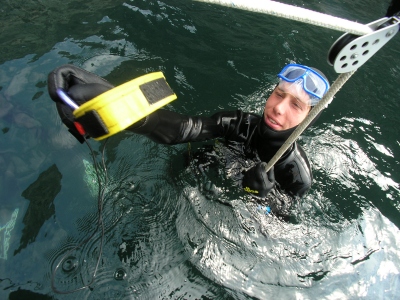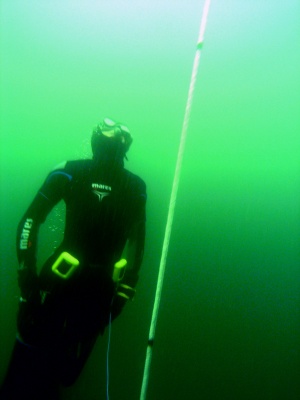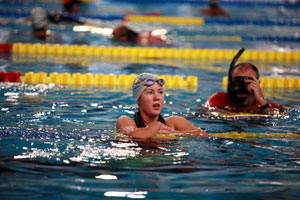 |
 |
The author of this article had taken her first freediving course only two weeks before joining a competition. A little nervous - sure. But it was a great learning experience.
Now she is aiming for a top ranking at the next World Championships.
First time competing? by Annelie Pompe
A guideline for the first time competitor
Never mind lifting weights - it's a little too late to get strong. Rather spend the extra time left on stretching/relaxation exercises and breath hold training.
Stay healthy!
Don't train too much! The last 4-5 days before the competition you should be resting - maybe only stretching, to keep flexible and relaxed musculature. It's very important that you stay healthy and well during the last weeks. If you get ill you have pretty much ruined your chances at the competition. Make sure you eat nutritious and well-prepared food containing all the important nutrients. Extra important during times of hard training is antioxidants. They fight all the free radicals that break down your immune system, and which are created by hard physical training and breath holds. You can find antioxidants in all dark coloured fruits and veggies, such as; broccoli, grapes, pepper, oranges and berries. To make sure you get all you need, or if you want to be lazy - use nutritional supplements. Also make sure you get enough sleep.
Also, try out different foods to eat - or not to eat, before a freedive. Some prefers to dive on an empty stomach. Some need a little bit of energy to dive. But leave a few hours in between your last meal and your competition dive.
Relax!
Remember: relaxation is “the secret” of freediving. If you can make both your body and mind relaxed you are saving huge amounts of oxygen, and the dive will be a hundred times more enjoyable. Practise being relaxed all the time, anytime! If you have never taught your body to be relaxed, it will not suddenly relax during a dive. So make special time to get to know the feeling of being relaxed. If your body recognises what total relaxation is, it will more likely be relaxed during your dive. Practise on “letting go”.
If your body feel relaxed - your mind will be relaxed. But if your mind is stressed or is getting a sense of panic, it will directly spread to your body. The link of body and mind is more obvious than normal when freediving. So - spend some time on your mind as well.
Visualise!
Visualisation techniques are one of the most powerful ways to control your body and mind. Did you know that if you are in an extremely relaxed state, and focusing on a series of events, your brain cannot sense what is real and what is just a focused thought. This fact you can use in a visualisation technique. Try to first make your body completely relaxed, then letting go of all thoughts and focusing your mind on the perfect dive. Follow yourself from the warm-up to the competition line, and through the whole dive. Try to use as many senses as possible; imagine sounds around you, feel your focus, think positive thoughts, feel the water against your face, see yourself doing a perfect duck-dive, using perfectly relaxed technique, grabbing the tag at the bottom and easily swimming up and finally performing the surface protocol. The more times you do this, the more your body will think you've done the competition dive a hundred times already. It will be easy!
Good luck!
Next, read “what to do the last days before a competition”.
A guideline for the first time competitor
 |
First of all: You don't have to be at a certain level to participate in a competition. Second: Are you really sure you WANT to compete? It might take some of the joy away from freediving; you have to obey certain rules in order to not get disqualified, you will not see any nice fish (unless you face a jellyfish up close), and you only get one try to perform your best dive. |
But there are many great things about competing.
It's great motivation having a goal for your freedive training. You'll learn just as much during a competition as during a freediving course - you'll meet other nice freedivers and see them prepare, dive and you can ask them all your questions. Also, you'll get to know yourself in a competitive situation. Maybe, if you're a competitive person you'll even make your best dives during the competition..
Do not view freediving competitions as competing against others - that will only stress you out. You can only dive to your maximum depth, and that's all you can do. You will not even know what depths the others will do until you have announced your own. (In competitions you have to announce your depth the day before you are going to dive). The only gamble is if you are certain enough on your depth to add a few meters. You have the best safety and all the attention and preparation to make a deep dive. Some persons add a few meters to their personal bests, and some takes away 5 meters from their personal best, to make sure they don't feel stressed. You have to know how you perform during that kind of stress.
What to do the weeks before a competition.
That's why it's a good idea to a few weeks before a competition practise during competition-like circumstances; before you reach the dive-site set a certain time, which will be your “top-time”, and then have someone count down the last 10 minutes to the last second before that time.
It's good if you have some idea how long your warm-up will take, so you know when to enter the water. Try out different kinds of warm-ups. The perfect warm-up will not make you tired and definitely not lactic in your body. You should not be in the water so you get too cold, and you should have enough time to relax and breathe before your dive. The standard is to make about 3 fairly shallow dives before, but try different things to find out what fits you.
At all dives you do, practise like it was your one competition dive. Read the rules and follow them. It's such a pity to be disqualified because a minor mistake of following the surface protocol, the rope-rules or the rules of the coach behaviour.
Never mind lifting weights - it's a little too late to get strong. Rather spend the extra time left on stretching/relaxation exercises and breath hold training.
Stay healthy!
Don't train too much! The last 4-5 days before the competition you should be resting - maybe only stretching, to keep flexible and relaxed musculature. It's very important that you stay healthy and well during the last weeks. If you get ill you have pretty much ruined your chances at the competition. Make sure you eat nutritious and well-prepared food containing all the important nutrients. Extra important during times of hard training is antioxidants. They fight all the free radicals that break down your immune system, and which are created by hard physical training and breath holds. You can find antioxidants in all dark coloured fruits and veggies, such as; broccoli, grapes, pepper, oranges and berries. To make sure you get all you need, or if you want to be lazy - use nutritional supplements. Also make sure you get enough sleep.
Also, try out different foods to eat - or not to eat, before a freedive. Some prefers to dive on an empty stomach. Some need a little bit of energy to dive. But leave a few hours in between your last meal and your competition dive.
 |
Find a good friend! Competitive freediving is not an individual sport. It's next to impossible to perform good without someone helping you. You need help with keeping your time, bringing everything with you, being at the right place at the right time, keeping you calm and so on. So find yourself a coach! The coach should know you pretty well, to know how you behave when you are stressed, when you want to be alone e t c. If your coach have never been freediving or been at a competition you have to let the coach know a few things: Let him/her read the rules of the competition. There are certain things a coach are and are not allowed to do. Let him/her practise with you when you train in competition-like circumstances. Teach him/her rescue techniques. |
Remember: relaxation is “the secret” of freediving. If you can make both your body and mind relaxed you are saving huge amounts of oxygen, and the dive will be a hundred times more enjoyable. Practise being relaxed all the time, anytime! If you have never taught your body to be relaxed, it will not suddenly relax during a dive. So make special time to get to know the feeling of being relaxed. If your body recognises what total relaxation is, it will more likely be relaxed during your dive. Practise on “letting go”.
If your body feel relaxed - your mind will be relaxed. But if your mind is stressed or is getting a sense of panic, it will directly spread to your body. The link of body and mind is more obvious than normal when freediving. So - spend some time on your mind as well.
Visualise!
Visualisation techniques are one of the most powerful ways to control your body and mind. Did you know that if you are in an extremely relaxed state, and focusing on a series of events, your brain cannot sense what is real and what is just a focused thought. This fact you can use in a visualisation technique. Try to first make your body completely relaxed, then letting go of all thoughts and focusing your mind on the perfect dive. Follow yourself from the warm-up to the competition line, and through the whole dive. Try to use as many senses as possible; imagine sounds around you, feel your focus, think positive thoughts, feel the water against your face, see yourself doing a perfect duck-dive, using perfectly relaxed technique, grabbing the tag at the bottom and easily swimming up and finally performing the surface protocol. The more times you do this, the more your body will think you've done the competition dive a hundred times already. It will be easy!
Good luck!
Next, read “what to do the last days before a competition”.

